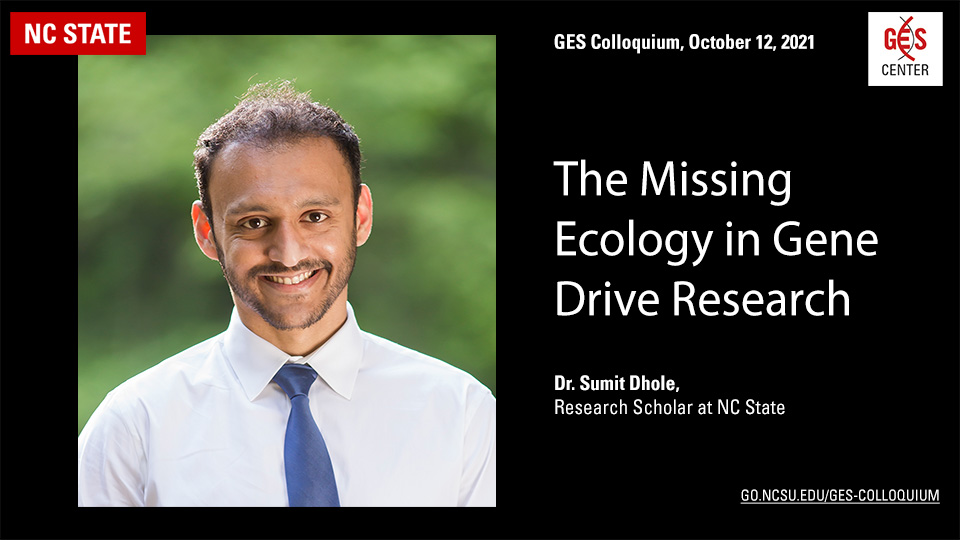
- This event has passed.
Sumit Dhole – The missing ecology in gene drive research | GES Colloquium

Colloquium Home | Zoom Registration | GES Video Library (current) | Video Archives | Podcast | @GESCenterNCSU | Newsletter
The missing ecology in gene drive research
Dr. Sumit Dhole, Research Scholar in Mathematical Biology, NC State
A discussion about some of the ecological aspects of population suppression using gene drives, and areas that need more research.
Abstract
Gene drives are rapidly emerging as a potential tool for controlling populations of disease vectors, invasive species and agricultural pests. The molecular research to create new and improved gene drives based on the CRISPR technology has progressed rapidly. While this research has been encouraging from the perspective of developing these tools, there remain large gaps in our understanding of how natural populations would respond to the release of gene drives. Dr. Dhole will discuss some of the ecological processes that will play an important role and that need more research in natural pest populations.
Related links:
- Rajagopalan PK, Curtis CF, Brooks GD, Menon PK. The density dependence of larval mortality of Culex pipiens fatigans in an urban situation and prediction of its effects on genetic control operations. Indian J Med Res. 1977.
- North, A., Burt, A. & Godfray, H. Modelling the potential of genetic control of malaria mosquitoes at national scale. BMC Biol 17, 26 (2019). https://doi.org/10.1186/s12915-019-0645-5
- James J Bull, Christopher H Remien, Stephen M Krone, Gene-drive-mediated extinction is thwarted by population structure and evolution of sib mating. Evolution, Medicine, and Public Health, Volume 2019, Issue 1, 2019, Pages 66–81, https://doi.org/10.1093/emph/eoz014
Speaker Bio
Dr. Sumit Dhole is an evolutionary ecologist who uses mathematical models to study how genes can spread through natural populations. For the past few years at NC State his focus has been on understanding how synthetic gene drives might behave if introduced into natural populations. While gene drives, which are highly invasive genetic constructs, may provide a solution for rapid and species-specific management of disease vectors and agricultural pests, a major concern is the potential of their unchecked spread to non-target populations. Through his work, Sumit tries to understand what factors and design features may allow synthetic gene drives to spread in safe, contained manners.
GES Colloquium is jointly taught by Drs. Dawn Rodriguez-Ward and Jen Baltzegar, who you may contact with any class-specific questions. As conditions allow, colloquium will be held in-person in Poe 202, as well as live-streamed via Zoom. Please subscribe to the GES newsletter for updates (links above).
WordPress database error: [Unknown column 'wp_tec_occurrences.start_date' in 'SELECT']SELECT SQL_CALC_FOUND_ROWS wp_posts.*, CAST( wp_tec_occurrences.start_date AS DATETIME ) AS event_date
FROM wp_posts LEFT JOIN wp_term_relationships ON (wp_posts.ID = wp_term_relationships.object_id) LEFT JOIN wp_postmeta ON ( wp_posts.ID = wp_postmeta.post_id AND wp_postmeta.meta_key = '_EventHideFromUpcoming' ) LEFT JOIN wp_postmeta AS mt1 ON ( wp_posts.ID = mt1.post_id )
WHERE 1=1 AND wp_posts.ID NOT IN (16536) AND (
wp_term_relationships.term_taxonomy_id IN (149,521,802)
OR
wp_term_relationships.term_taxonomy_id IN (45,47)
) AND (
wp_postmeta.post_id IS NULL
AND
( mt1.meta_key = '_EventStartDate' AND CAST(mt1.meta_value AS DATETIME) >= '2026-02-13 07:20:42' )
) AND wp_posts.post_type IN ('post', 'page', 'attachment', 'tribe_venue', 'tribe_events', 'tribe_event_series') AND ((wp_posts.post_status = 'publish'))
GROUP BY wp_tec_occurrences.occurrence_id
ORDER BY event_date ASC, wp_posts.post_date ASC
LIMIT 0, 3